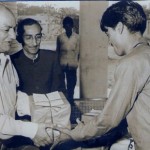Three poems by Faiz Ahmed Faiz translated by Umair Kazi
 I can’t remember when I first encountered Faiz’s poetry, which is to say, I can’t think of a time when Faiz wasn’t a part of my world. The idiom I grew up with in Pakistan was suffused with his words. I knew them before I understood them and I’d heard the music before I could feel its pathos. Iqbal Bano’s renditions of Yaad (Memory) and Hum Dekhenge—without which no mention of Faiz’s poetry is complete—rang out unceasingly from my grandfather’s tape player; as did Begum Akhtar’s Sham-i-fiaq ab na pooch and Mehdi Hassan’s Gulon mein rang bhare, songs that immortalized Faiz’s words beyond the page.
I can’t remember when I first encountered Faiz’s poetry, which is to say, I can’t think of a time when Faiz wasn’t a part of my world. The idiom I grew up with in Pakistan was suffused with his words. I knew them before I understood them and I’d heard the music before I could feel its pathos. Iqbal Bano’s renditions of Yaad (Memory) and Hum Dekhenge—without which no mention of Faiz’s poetry is complete—rang out unceasingly from my grandfather’s tape player; as did Begum Akhtar’s Sham-i-fiaq ab na pooch and Mehdi Hassan’s Gulon mein rang bhare, songs that immortalized Faiz’s words beyond the page.
 But what is a song other than a marriage of the language of music with the music of language? If you listen closely to Iqbal Bano singing “Memory”, you’ll hear how the melody swells when she intones, uth rahi hai…(“it” rises); her voice crackles at the incidence of aanch (“it” the flame); then gets softer and scanter at mudham, mudham (“dimly, softly”) and, finally, at qatra, qatra (“drop by drop”), the barely perceptible, heavy silence between the repetition of these words brings to the listener’s mind an image of tiny plumes of dew forming on the nib of a leaf, dropping, and then forming again.
But what is a song other than a marriage of the language of music with the music of language? If you listen closely to Iqbal Bano singing “Memory”, you’ll hear how the melody swells when she intones, uth rahi hai…(“it” rises); her voice crackles at the incidence of aanch (“it” the flame); then gets softer and scanter at mudham, mudham (“dimly, softly”) and, finally, at qatra, qatra (“drop by drop”), the barely perceptible, heavy silence between the repetition of these words brings to the listener’s mind an image of tiny plumes of dew forming on the nib of a leaf, dropping, and then forming again.
I was motivated to translate these poems because I wanted to share with my non-Urdu speaking friends and readers the vision of a poet, whose language continues to shape me. For us migrants, Faiz’s poems and songs conjure the journey that is our destination, the placeleness that is our home. None of these is a first-time translation; however I do think that they capture some nuances of Faiz’s poems that other translators have either missed or foregone in order to accommodate for other—perhaps, in their judgment more important—elements of his poetry. Faiz’s use of colloquial language, for instance, is frequently sacrificed to stronger expressions of his images. Urdu is capable of generating noun combinations through the addition of nouns with nouns and with other parts of speech—the muted genitive “-i-”, obviating prepositions and articles, allows the poet to express layered images with an economy of syllables that is irreproducible in English; consequently, translators often translate those images as elaborated phrases. I have, when I could, avoided this practice in favor of creating new words in harmony with the original image, thought, and sentiment.
— Umair Kazi
yaad
by Faiz Ahmed Faizyaad
dasht-e-tanhā.ī meñ ai jaan-e-jahāñ larzāñ haiñ
terī āvāz ke saa.e tire hoñToñ ke sarāb
dasht-e-tanhā.ī meñ duurī ke khas o khaak tale
khil rahe haiñ tire pahlū ke saman aur gulāb
uTh rahī hai kahīñ qurbat se tirī saañs k aañch
apnī khushbū meñ sulagtī huī maddham maddham
duur ufuq paar chamaktī huī qatra qatra
gir rahī hai tirī dildār nazar kī shabnam
is qadar pyaar se ai jaan-e-jahāñ rakkhā hai
dil ke rukhsār pe is vaqt tirī yaad ne haat
yuuñ gumāñ hotā hai garche hai abhī sub.h-e-firāq
Dhal gayā hijr kā din aa bhiī ga.ī vasl kī raat
Note: The original text appears in transliterated Roman Urdu due to incompatibilities between the original script and our publishing software. Many thanks to the translator for providing the transliteration.
Memory
by Faiz Ahmed FaizIn the desert of solitude, my love, are tremors
the shadows of your voice, mirages of your lips
In the desert of solitude, beneath the ash
and dust of distance, blossom the jasmines and roses
of your touch
A flame of your breath rises somewhere nearby,
smoldering softly in its own perfume
far beyond the horizon your heartening eyes
drop shimmering dew
How lovingly, my love, your memory visits me,
lays her hand on my heart:
I surmise—though, this is the dawn of parting
—that the day of migration has waned
and the night of our union, crested
translated from Urdu by Umair Kazimanzar
by Faiz Ahmed Faizmanzar
āsmāñ aaj ik bahr-e-pur-shor hai
jis meñ har-sū ravāñ bādaloñ ke jahāz
un ke arshe per kirnoñ ke mastūl haiñ
bādbānoñ kī pahne hue farġhaleñ
niil meñ gumbadoñ ke jazīre ka.ī
ek baazī meñ masrūf hai har koīī
vo abābīl koī nahātī huī
koī chiil ġhote meñ jaatī huī
koī tāqat nahīñ is meñ zor-aazmā
koī beDā nahīñ hai kisī mulk kā
is kī tah meñ koīābdozeñ nahīñ
koī rocket nahīñ koī topeñ nahīñ
yuuñ to saare anāsir haiñ yaañ zor meñ
amn kitnā hai is bahr-e-pur-shor meñ
Note: The original text appears in transliterated Roman Urdu due to incompatibilities between the original script and our publishing software. Many thanks to the translator for providing the transliteration.
Scene
by Faiz Ahmed FaizThe sky today is a sea-lane
busy with the ships of passing
clouds
whose decks are masted
with sunbeams draped in
diaphanous sails
The city’s domes are the islands
of this sea
where everyone is busy
risking it all:
see that blackbird swimming,
that eagle
diving in…
There is no contest of power
here: no battleship fleets or flags;
no submarines creeping on the
seabed; no rockets or cannons
And, though, every element
here is bursting with charge—
just look how peaceful
these bustling waters are
Samarkand, 1978
translated from Urdu by Umair Kazikahāñ jāoge
by Faiz Ahmed Faizkahāñ jāoge
aur kuch der meñ luT jā.egā har baam pe chāñd
aks kho jā.eñge ā.īne taras jā.eñge
arsh ke diida-e-namnāk se baarī-baarī
sab sitāre sar-e-khāshāk baras jā.eñge
aas ke maare thake hare shabistānoñ meñ
apnī tanhāi.ī sameTegā, bichhā.egā koī
bevafā.ī kī ghaDī, tark-e-madārāt ka vaqt
is ghaDī apne sivā yaad na aa.egā koī
tark-e-duniyā kā samāñ khatm-e-mulāqāt ka vaqt
is ghaDī ai dil-e-āvāra kahāñ jāoge
is ghaDī koī kisi kā bhi nahīñ rahne do
koī is vaqt milegā hī nahīñ rahne do
aur mile gā bhī is taur ki pachtāoge
is ghaDī ai dil-e-āvāra kahāñ jāoge
aur kuchh der Tahar jaao ki phir nashtar-e-sub.h
zakhm kī tarah har ik aañkh ko bedār kare
aur har kushta-e-vāmāñdgī-e-ākhir-e-shab
bhuul kar saa.at-e-darmāndagī-e-ākhir-e-shab
jaan pahchān mulāqāt pe isrār kare
Note: The original text appears in transliterated Roman Urdu due to incompatibilities between the original script and our publishing software. Many thanks to the translator for providing the transliteration.
Where Will You Go?
by Faiz Ahmed FaizIn a little while,
the moon will be
robbed on every
rooftop;
mirrors will thirst
for vanished reflections.
One by one, the stars will
disintegrate—
exploding into
dust that will rain down
from heaven’s moist eyes.
Inside night-quarters
tired beyond hope
someone will gather his
loneliness, he will spread it
over;
at this faithless hour,
at this time of turning away—
when every man is only for
himself without memory
of another,
at this hour of severance,
at the end of our tryst
with the world:
wild heart, where will you go
at this hour?
No one will recognize you, let it go.
Who will you find now? Let it go.
And whoever you come across
by chance, you’ll regret seeing:
wild heart, where will you go
at this hour?
Stay a little longer—
wait until morning’s fleam
has roused every eye once more
like a wound;
then all the helpless slain
at the end of the night—
forgetting the destitute hour,
the end of the night—
will insist on meeting,
on being called by name
translated from Urdu by Umair Kazi